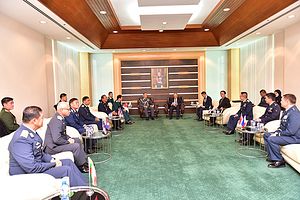Last week, this year’s iteration of an annual meeting between ASEAN air force chiefs occurred in Brunei. While the engagement was just one among a long list of meetings on the annual ASEAN calendar, it nonetheless highlighted one aspect of ongoing efforts to bolster defense cooperation in the subregion.
As I have observed before in these pages, under the ASEAN regional grouping, Southeast Asian states have developed an ever-increasing number of meetings through which they engage on the security side. One of these institutions is the ASEAN Air Chiefs Conference (AACC), which was initially established back in 2004, with the first official meeting held in Thailand.
Over the years, the AACC has remained a key platform for regional air forces to engage. The engagement has provided a platform for the air force chiefs and personnel to meet annually to enhance rapport, understanding, and cooperation and to discuss a wide array of subjects, such as military aviation and wider multilateral air force collaboration in areas ranging from counterterrorism to humanitarian assistance and disaster relief.
Last week, the AACC was in the headlines with the holding of the latest iteration of the interaction. The 16th AACC was held from September 2 to September 5, and it was hosted this time by Brunei and the Royal Brunei Air Force (RBAirF), which had last hosted it back in 2009.
The 2019 AACC, held under the theme of “Elevating ASEAN Solidary Through Practical Cooperation,” featured a series of interactions. Per Brunei’s defense ministry (MINDEF), the engagement included a series of interactions including consultations between the air force communities from Southeast Asian countries and conference presentations from invited speakers and the ASEAN air chiefs themselves – all ten of which were in attendance this year – on issues of common interest.
Beyond that, the AACC featured other interactions involving the host country as well. The commander of the Royal Brunei Armed Forces (RBAF) delivered a keynote address where he highlighted a number of issues including the importance of ASEAN Air Force collaboration amid wider trends and challenges, and the ASEAN Air Force Chiefs also had a joint courtesy call with Brunei’s second defense minister (the defense minister position is still held by the head of state Sultan Hassanal Bolkiah).
As is customary, few specifics were publicly disclosed about the private deliberations between the Southeast Asian countries. Nonetheless, the engagement spotlighted efforts by them to advance defense collaboration in this realm, which remains an ongoing project.

































